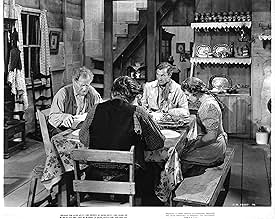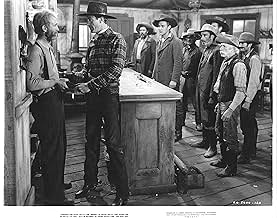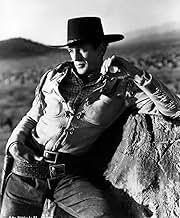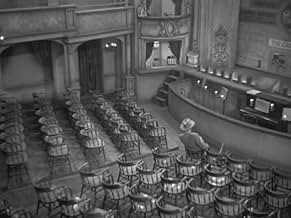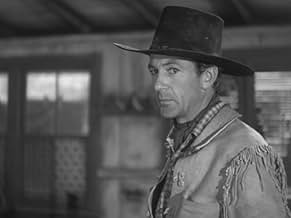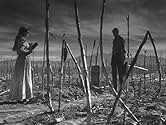NOTE IMDb
7,3/10
7,3 k
MA NOTE
Roy Bean, juge autoproclamé et arbitraire à Vinegarroon, au Texas, se lie d'amitié avec Cole Harden, cowboy itinérant, qui s'oppose à la politique de Bean contre les colons.Roy Bean, juge autoproclamé et arbitraire à Vinegarroon, au Texas, se lie d'amitié avec Cole Harden, cowboy itinérant, qui s'oppose à la politique de Bean contre les colons.Roy Bean, juge autoproclamé et arbitraire à Vinegarroon, au Texas, se lie d'amitié avec Cole Harden, cowboy itinérant, qui s'oppose à la politique de Bean contre les colons.
- Réalisation
- Scénario
- Casting principal
- Récompensé par 1 Oscar
- 5 victoires et 2 nominations au total
C.E. Anderson
- Hezekiah Willever
- (non crédité)
Stanley Andrews
- Sheriff
- (non crédité)
Arthur Aylesworth
- Mr. Dixon
- (non crédité)
Bill Beauman
- Man Getting Haircut
- (non crédité)
Avis à la une
Samuel Goldwyn's The Westerner would be considered a good western about that old familiar topic in westerns, the cattlemen versus the homesteaders. Gary Cooper is his usual tall in the saddle hero whose presence brings about a general righting of wrongs.
Except that Mr. Goldwyn had the presence of mind to cast Walter Brennan as Judge Roy Bean, local head honcho of the area around Vinegarroon, Texas. With William Wyler directing Brennan etches an unforgettable film portrayal of a man who's both ruthless in enforcing his will on the territory and a likable sort of cuss once you get to know him.
Brennan has one weakness, as the legends have it in the west, he's crushing out big time of famed English actress Lily Langtry. When Gary Cooper is brought into Brennan's courtroom which in off hours is also a saloon, a little quick thinking on his part upon seeing Langtry's portrait over the bar saves his life.
Despite Cooper's friendship with the judge, he's also taken an interest in homesteader Fred Stone's daughter, Doris Davenport. It's inevitable that Cooper and Brennan come to a parting of the ways.
Wyler who is not a director of westerns per se has directed a couple of good ones and this is one of them. There are some good action scenes here, there are some scenes laced with humor when Brennan is around, and the romance is nicely handled.
Dana Andrews and Forrest Tucker got their first notice in The Westerner as well in small parts. But it's Brennan's show.
Walter Brennan won his third Best Supporting Actor Oscar with this film. This was the fifth year the Supporting Player categories were being awarded by the Academy and Brennan won numbers one and three previously.
Western fans will like The Westerner in any event and others will watch it to see a master craftsman in Walter Brennan at his job.
Except that Mr. Goldwyn had the presence of mind to cast Walter Brennan as Judge Roy Bean, local head honcho of the area around Vinegarroon, Texas. With William Wyler directing Brennan etches an unforgettable film portrayal of a man who's both ruthless in enforcing his will on the territory and a likable sort of cuss once you get to know him.
Brennan has one weakness, as the legends have it in the west, he's crushing out big time of famed English actress Lily Langtry. When Gary Cooper is brought into Brennan's courtroom which in off hours is also a saloon, a little quick thinking on his part upon seeing Langtry's portrait over the bar saves his life.
Despite Cooper's friendship with the judge, he's also taken an interest in homesteader Fred Stone's daughter, Doris Davenport. It's inevitable that Cooper and Brennan come to a parting of the ways.
Wyler who is not a director of westerns per se has directed a couple of good ones and this is one of them. There are some good action scenes here, there are some scenes laced with humor when Brennan is around, and the romance is nicely handled.
Dana Andrews and Forrest Tucker got their first notice in The Westerner as well in small parts. But it's Brennan's show.
Walter Brennan won his third Best Supporting Actor Oscar with this film. This was the fifth year the Supporting Player categories were being awarded by the Academy and Brennan won numbers one and three previously.
Western fans will like The Westerner in any event and others will watch it to see a master craftsman in Walter Brennan at his job.
The Westerner will seldom make it on anyone's top ten westerns list, even one compiled by those of us who haven't succumbed to the garlicky charms of the Man with No Name. But this is one of the top notch hay-consumers of all time, make no mistake.
What can you say about Gary Cooper that has not already been voiced over and over. His beautifully understated acting style, the subtle twitches and raised eyebrows. His bearing. The way he sits a horse, as only someone who grew up on a Montana ranch can. The sure enough Western accent. Had he discovered the ear-pull yet, I didn't notice it in this one. Until watching this movie on a newly restored DVD tonight, I had not seen it in 20 years, and had come to think of it as more of a Walter Brennan movie. I was wrong. Brennan was there with all his fine tools, all right, and he royally deserved his best-supporting award, but that is what his role was. When it's a Gary Cooper movie, it's a Gary Cooper movie. Never having been a fan of High Noon, I had thought maybe Dallas or Vera Cruz were Coop's best westerns. But The Westerner gives us the definitive Gary Cooper.
The movie is handsomely turned out in the sensuously luminous black and white cinematography, fluid editing and silky-smooth scene changes we have come to accept as standard for top studio productions of the late 'thirties, 'forties era, and every cinematic effect is enhanced by a stirring Dimitri Tiomin score. The sets and costumes are superb with a much more authentic look and feel for the old west than most westerns before or since. The clothes of both the men and women, both the cowboys and the farmers, the gun leather, and the buildings, are all unusually accurate to the time and place. Refreshingly, the heroine of our piece, sensitively and strongly played by the beautiful but obscure Doris Davenport, wears a long, feminine dress and uses a wagon for transportation, rather than wearing men's jeans and riding astraddle a horse with her Tangee lipstick blaring as we see in so many great and small westerns. All the other characters, both male and female, come off like real 19th century men and women, not products of the time in which the film was made. William Wyler's direction is virtually flawless with just the right blend of action, tension, and humor. But considering the acting talent, the cinematographers, lighting specialists, art directors, and other technical help any director in the awesomely efficient big studio systems of the time had available, maybe he just knew how to stay out of the way.
What can you say about Gary Cooper that has not already been voiced over and over. His beautifully understated acting style, the subtle twitches and raised eyebrows. His bearing. The way he sits a horse, as only someone who grew up on a Montana ranch can. The sure enough Western accent. Had he discovered the ear-pull yet, I didn't notice it in this one. Until watching this movie on a newly restored DVD tonight, I had not seen it in 20 years, and had come to think of it as more of a Walter Brennan movie. I was wrong. Brennan was there with all his fine tools, all right, and he royally deserved his best-supporting award, but that is what his role was. When it's a Gary Cooper movie, it's a Gary Cooper movie. Never having been a fan of High Noon, I had thought maybe Dallas or Vera Cruz were Coop's best westerns. But The Westerner gives us the definitive Gary Cooper.
The movie is handsomely turned out in the sensuously luminous black and white cinematography, fluid editing and silky-smooth scene changes we have come to accept as standard for top studio productions of the late 'thirties, 'forties era, and every cinematic effect is enhanced by a stirring Dimitri Tiomin score. The sets and costumes are superb with a much more authentic look and feel for the old west than most westerns before or since. The clothes of both the men and women, both the cowboys and the farmers, the gun leather, and the buildings, are all unusually accurate to the time and place. Refreshingly, the heroine of our piece, sensitively and strongly played by the beautiful but obscure Doris Davenport, wears a long, feminine dress and uses a wagon for transportation, rather than wearing men's jeans and riding astraddle a horse with her Tangee lipstick blaring as we see in so many great and small westerns. All the other characters, both male and female, come off like real 19th century men and women, not products of the time in which the film was made. William Wyler's direction is virtually flawless with just the right blend of action, tension, and humor. But considering the acting talent, the cinematographers, lighting specialists, art directors, and other technical help any director in the awesomely efficient big studio systems of the time had available, maybe he just knew how to stay out of the way.
This western film features several top elements that help make it a classic in its genre. Director Wyler was regarded by many people as one of the all time greats. Cinematographer Toland was also a well-respected presence in his field. Producer Goldwyn was famed for his attention to quality. (This trio had, in fact, just made "Wuthering Heights together the year before.) Then, of course, there is the delightful (and Oscar-winning) presence of famed character actor Brennan as Judge Roy Bean. This is not in any way discounting the work of Cooper who is highly effective and appealing here as well. Cooper plays the title character, a drifter who has the unlucky prospect of having to appear before the notorious "hangin' judge" Brennan. Once his case is settled, he forms an uneasy alliance with Brennan, while also sticking around long enough to help damsel in distress Davenport. Before long, he's in the middle of a range war between cattle ranchers and farmers all being unfairly presided over by Brennan (who has an undue fascination with the actress Lily Langtry.) Cooper is gorgeous in this film and gives a strong performance (despite his documented disinterest in it due to the knowledge that Brennan had the best part.) Brennan predictably steals most every scene he's in in a part that is more co-starring than supporting. Still, his rapport with Cooper is what gives his role meaning. Although riddled with what are now cliches, the script is full of neat touches between the two men. It's not every day a viewer catches Gary Cooper waking up drunk in a twin bed with Walter Brennan's arm around him! This sequence (as well as one earlier when the two men square off over "a drink") is priceless. There's also a memorable showdown in an opera house. Davenport makes a lovely, if unusual heroine (earthier and less slender than many leading ladies of her day.) She would retire shortly after this film. Tucker will be almost unrecognizable to his fans from "F Troop" and other later works of his. Andrews is given very little to do. The film might have been better off with a more apt title as it's less the story of "The Westerner" than it is an observation of the relationship between these two men.
I first watched this movie because of Gary Cooper (after seeing "The Pride of the Yankees," the man could do no wrong in my book). While Coop is great in "The Westerner," it is -- lock, stock and blazing barrels -- Walter Brennan's performance as Judge Roy Bean that steals the show. What a deeply nuanced character! Here's an example of an actor making a villain a likeable, endearing character. Brennan richly deserved his Best Supporting Actor Oscar.
Walter Brennan stars as Judge Roy Bean, the legendary self appointed law west of the Pecos in Texas. He uses whoever happens to be in his saloon as a jury, and the penalty of death is often dispensed for killing or stealing the animals of others.
At this time Cole Harden (Gary Cooper) is brought to the judge for stealing a horse. Cole claims he bought this horse, although he admits the person he bought it from may have stolen it from the original owner. The judge is not impressed, and he can tell neither is the jury. So while the jury deliberates, Cole makes conversation with the judge, figures out he is obsessed with British actress Lillie Langtry, and talks about the time he met her, and about the lock of her hair that he has back in El Paso. Then the jury comes back with the expected guilty verdict. The judge defers Cole's sentence until he can look into matters more, since he says that no friend of Lillie Langtry could be a horse thief. Plus Bean really wants to hear more of Cole's tales of meeting Lillie Langry, and he really wants to see that lock of hair. Later, luck would have it that the actual horse thief wanders into Judge Bean's bar. When Cole shows that he still has the sixty dollars that he paid for the horse on him, there is a shootout and Bean shoots the actual thief dead, freeing Cole.
What I just described is the best part of the film. And I really haven't spoiled anything by telling you this since the art of it is in Brennan's and Cooper's delivery and the chemistry that they had together. But because an entire feature film is needed, there is a significant subplot about the judge being pro cattleman and thus backing people who sabotage the farming homesteaders nearby. This subplot is not that compelling and neither is the romance between Cooper's Cole and one of the daughters of the homesteaders, played by Doris Davenport. Davenport wasn't a very interesting actress, and she had only one other credited role the same year this film came out before leaving acting entirely.
I'd say watch it for probably the best thing Walter Brennan ever did and the great chemistry he had with Gary Cooper, but that the rest of the film, when Cooper and Brennan are not interacting, can be a bit of a bore.
At this time Cole Harden (Gary Cooper) is brought to the judge for stealing a horse. Cole claims he bought this horse, although he admits the person he bought it from may have stolen it from the original owner. The judge is not impressed, and he can tell neither is the jury. So while the jury deliberates, Cole makes conversation with the judge, figures out he is obsessed with British actress Lillie Langtry, and talks about the time he met her, and about the lock of her hair that he has back in El Paso. Then the jury comes back with the expected guilty verdict. The judge defers Cole's sentence until he can look into matters more, since he says that no friend of Lillie Langtry could be a horse thief. Plus Bean really wants to hear more of Cole's tales of meeting Lillie Langry, and he really wants to see that lock of hair. Later, luck would have it that the actual horse thief wanders into Judge Bean's bar. When Cole shows that he still has the sixty dollars that he paid for the horse on him, there is a shootout and Bean shoots the actual thief dead, freeing Cole.
What I just described is the best part of the film. And I really haven't spoiled anything by telling you this since the art of it is in Brennan's and Cooper's delivery and the chemistry that they had together. But because an entire feature film is needed, there is a significant subplot about the judge being pro cattleman and thus backing people who sabotage the farming homesteaders nearby. This subplot is not that compelling and neither is the romance between Cooper's Cole and one of the daughters of the homesteaders, played by Doris Davenport. Davenport wasn't a very interesting actress, and she had only one other credited role the same year this film came out before leaving acting entirely.
I'd say watch it for probably the best thing Walter Brennan ever did and the great chemistry he had with Gary Cooper, but that the rest of the film, when Cooper and Brennan are not interacting, can be a bit of a bore.
Le saviez-vous
- AnecdotesGary Cooper never liked the film and said, "You can't make a western without a gunfight." He walked off the film and refused to start work on it. It was only after long battles with Samuel Goldwyn that he started work on it but always said that he wished he'd never made it.
- GaffesThe town was named for George Langtry, an engineer and foreman who had supervised a Chinese work crew building the railroad, and not for the actress Lillie Langtry.
- Citations
Judge Roy Bean: Mr. Harden, it's my duty to inform you that the larceny of an equine is a capital offense punishable by death, but you can rest assured that in this court, a horse thief always gets a fair trial before he's hung.
- Crédits fousOpening credits: "After the Civil War, America, in the throes of rebirth, set its face West where the land was free. First came the cattlemen and with them "Judge" Roy Bean, who took the law into his own hands, administering justice according to his lights. That he left his impress on the history of Texas is tribute to his greatness. Then into his stronghold moved another army, the homesteaders, who ploughed the soil, fenced in fields, to bring security to their wives and children. War was inevitable, a war out of which grew the Texas of today."
- ConnexionsFeatured in Hollywood: The Great Stars (1963)
Meilleurs choix
Connectez-vous pour évaluer et suivre la liste de favoris afin de recevoir des recommandations personnalisées
- How long is The Westerner?Alimenté par Alexa
Détails
Box-office
- Budget
- 2 000 000 $US (estimé)
- Durée
- 1h 40min(100 min)
- Couleur
- Rapport de forme
- 1.37 : 1
Contribuer à cette page
Suggérer une modification ou ajouter du contenu manquant

